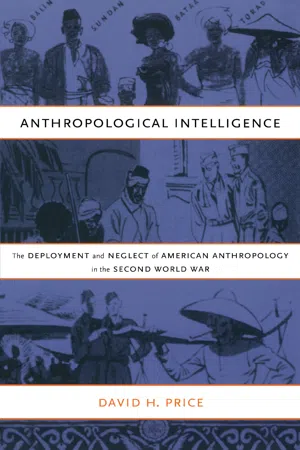
Anthropological Intelligence
The Deployment and Neglect of American Anthropology in the Second World War
- English
- PDF
- Available on iOS & Android
Anthropological Intelligence
The Deployment and Neglect of American Anthropology in the Second World War
About This Book
By the time the United States officially entered World War II, more than half of American anthropologists were using their professional knowledge and skills to advance the war effort. The range of their war-related work was extraordinary. They helped gather military intelligence, pinpointed possible social weaknesses in enemy nations, and contributed to the army's regional Pocket Guide booklets. They worked for dozens of government agencies, including the Office of Strategic Services (OSS) and the Office of War Information. At a moment when social scientists are once again being asked to assist in military and intelligence work, David H. Price examines anthropologists' little-known contributions to the Second World War.
Anthropological Intelligence is based on interviews with anthropologists as well as extensive archival research involving many Freedom of Information Act requests. Price looks at the role played by the two primary U.S. anthropological organizations, the American Anthropological Association and the Society for Applied Anthropology (which was formed in 1941), in facilitating the application of anthropological methods to the problems of war. He chronicles specific projects undertaken on behalf of government agencies, including an analysis of the social effects of postwar migration, the design and implementation of OSS counterinsurgency campaigns, and the study of Japanese social structures to help tailor American propaganda efforts. Price discusses anthropologists' work in internment camps, their collection of intelligence in Central and South America for the FBI's Special Intelligence Service, and their help forming foreign language programs to assist soldiers and intelligence agents. Evaluating the ethical implications of anthropological contributions to World War II, Price suggests that by the time the Cold War began, the profession had set a dangerous precedent regarding what it would be willing to do on behalf of the U.S. government.
Frequently asked questions
Information
Table of contents
- Contents
- Preface
- Abbreviations
- One - American Anthropology and the War to End All Wars
- Two - Professional Associations and the Scope of American Anthropology’s Wartime Applications
- Three - Allied and Axis Anthropologies
- Four - The War on Campus
- Five - American Anthropologists Join the Wartime Brain Trust
- Six - Anthropologists and White House War Projects
- Seven - Internment Fieldwork: Anthropologists and the War Relocation Authority
- Eight - Anthropology and Nihonjinron at the Office of War Information
- Nine - Archaeology and J. Edgar Hoover’s Special Intelligence Service
- Ten - Culture at War: Weaponizing Anthropology at the oss
- Eleven - Postwar Ambiguities: Looking Back at the War
- Notes
- Bibliography
- Index